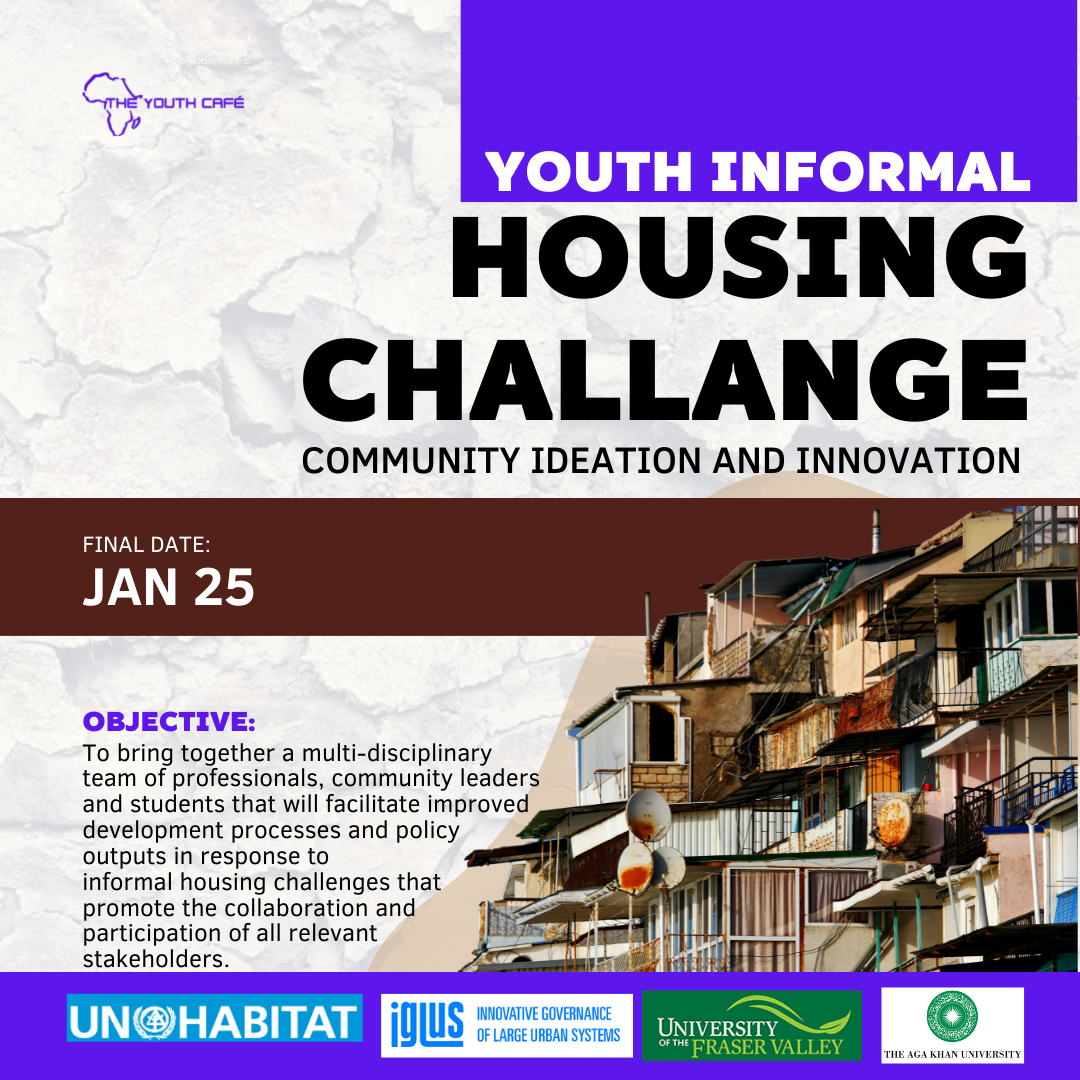Can Young People Solve The Informal Housing Challenge In Kenya?
Can young people change the world by acting as agents for sustainable development? Could they become part of the solution to the informal housing challenge? Housing is one of our most fundamental requirements, yet it is becoming increasingly difficult to provide for many people all around the world. It has become a problem, particularly in Africa. We can therefore say that the housing crisis is a worldwide concern for young people.
Informal settlements are areas developed outside of planning regulations and legally sanctioned housing and land markets, while slums are a form of informal settlements specifically located in urban areas and majorly characterized by poverty and substandard living conditions.
Taking Kenya as an example, the number of people living in slums as a percentage of the total population is growing day in day out with Kibera alone being a home of close to 700,000 people. It is also estimated that about 3 billion people will require affordable housing by Kenya Vision 2030. This problem affects and cuts through the population of all ages, both the young and the old. In fact, the informal housing challenge can be said to affect the younger population more as this is the greater part of the population that has not yet made a deliberation about their settlement.
Many times you may wonder how and why is the housing challenge even a concern to the youth? Well, you cannot miss recognizing that 70-80% of the African youth more so those who may have received education up to a certain level, work in the informal sector. This, therefore, deters them from having access to formal financing which would have allowed them to buy or build a home. This then leads them to decide to haphazardly build their own informal housing or opt to stay in slums.
“I am a freelancer, I do take writing jobs and I can term myself as a successful writer in the online writer’s hub. I also do some deliveries within the town for restaurants and shops. I get lots of deliveries to make, which forces me to stay not far away from town. I have been living in Roysambu since 2019. But of late I am finding out that I am unable to afford to live here anymore. In the place where I am living the rent is being raised. It is effectively pushing me to look for a cheaper place to stay. And I think the only other place to get a cheaper house around town will be in a place like Kibera. I do not have an option but to move to Kibera.” –Vincent Owuor, 24, Nairobi, Kenya.
The housing challenge comes with a hidden consequence to the young generation. It forces more and more of them to join informal settlements. Thankfully, young people are taking action in response to the housing issue. They have recognized that the housing crisis can only be addressed if they build up their own solutions by engaging themselves in sustainable development projects to literally bring a solution to the housing crisis. Young people are realizing their collective strength and banding together to address the problem of housing that directly affects them.
The Government of Kenya, in collaboration with UN-HABITAT and other stakeholders, initiated the Kenya Slum Upgrading Programme (KENSUP) in 2004. The objective was to improve the lives and livelihoods of people working and living in slums through various initiatives and interventions. So far, KENSUP has made some major milestones.
The Government of Kenya also initiated The Kenya Informal Settlement Improvement Project (KISIP) supported by Development Partners in 2011. The project development objective was to improve living conditions and strengthen the security of tenure in informal settlements in selected towns in Kenya. KISIP has also made some major strides.
However, despite the efforts by the government to address the challenge of informal settlements, the issue still remains a major concern and more has to be done.
On February 19, 2022, The Youth Café is planning an event to address the informal housing challenge. The key partners in the event include; The Aga Khan University, University of the Fraser Valley, Innovative Governance of Large Urban Systems, UN-Habitat - Youth Café - Urban Economic Forum, and other private sector and community partners who focus on the informal youth housing challenge and its impact on young people.
Their objective is to bring together a multidisciplinary team of professionals, community leaders, and students that will facilitate improved development processes and policy outputs in response to informal housing challenges that promote the collaboration and participation of all relevant stakeholders.
The Youth Café, whose vision is to advance youth-led approaches toward achieving sustainable development, social equity, innovative solutions, community resilience, and transformative change, looks forward to collaborating with this team by recruiting and selecting participants and hosting the ideation session.
Participants will benefit in a number of ways. They will get a chance to meet and discuss the problem of informal housing with experts from the housing sector. Micro-financing institutions will also be present during the event and may decide to provide financing for the solutions. All the participants will get a certificate from University of the Fraser Valley. Selected ideas will get a chance to participate and showcase their ideas in the upcoming Urban Economic Forum.
All those who are interested in participating can fill out an online application form and submit it on or before 25th January 2022.
To get the Application Form
The Youth Café works with young men and women around Africa as a trailblazer in advancing youth-led approaches toward achieving sustainable development, social equity, innovative solutions, community resilience, and transformative change.
Contact us for any comments or suggestions.


